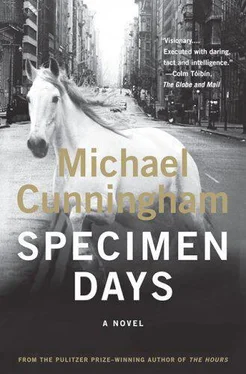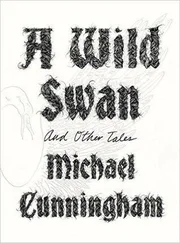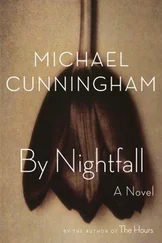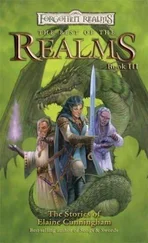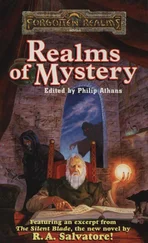Michael Cunningham - Specimen Days
Здесь есть возможность читать онлайн «Michael Cunningham - Specimen Days» — ознакомительный отрывок электронной книги совершенно бесплатно, а после прочтения отрывка купить полную версию. В некоторых случаях можно слушать аудио, скачать через торрент в формате fb2 и присутствует краткое содержание. Город: New York, Год выпуска: 2005, ISBN: 2005, Издательство: Farrar, Straus and Giroux, Жанр: Современная проза, на английском языке. Описание произведения, (предисловие) а так же отзывы посетителей доступны на портале библиотеки ЛибКат.
- Название:Specimen Days
- Автор:
- Издательство:Farrar, Straus and Giroux
- Жанр:
- Год:2005
- Город:New York
- ISBN:0-374-70515-1
- Рейтинг книги:4 / 5. Голосов: 1
-
Избранное:Добавить в избранное
- Отзывы:
-
Ваша оценка:
- 80
- 1
- 2
- 3
- 4
- 5
Specimen Days: краткое содержание, описание и аннотация
Предлагаем к чтению аннотацию, описание, краткое содержание или предисловие (зависит от того, что написал сам автор книги «Specimen Days»). Если вы не нашли необходимую информацию о книге — напишите в комментариях, мы постараемся отыскать её.
Specimen Days — читать онлайн ознакомительный отрывок
Ниже представлен текст книги, разбитый по страницам. Система сохранения места последней прочитанной страницы, позволяет с удобством читать онлайн бесплатно книгу «Specimen Days», без необходимости каждый раз заново искать на чём Вы остановились. Поставьте закладку, и сможете в любой момент перейти на страницу, на которой закончили чтение.
Интервал:
Закладка:
“Yes. Thank you.” As he followed Catherine out he said good-night to Alma and Sarah.
“Even the goblins prefers Catherine,” Alma said.
Sarah answered from the stove. “You should watch that mouth of yours, some goblin’ll fix it one day.”
Lucas stood with Catherine in the hall. It was like his own. A lamp flickered at one end, by the stairwell. Near the lamp, piles of paper, empty bottles, and a sack (what must it contain?) were visible in the semidark. At the hallway’s farther end, the refuse was only shadows. Halfway down, in the direction of the true dark, something lay atop a discarded oil can. Did it have teeth? Yes. It was a goat’s skull, boiled clean.
Catherine said, “I’m happy to see you again.”
Speak as Lucas, he bade himself. Don’t speak as the book.
He said, “I’m happy to see you, too. I wanted you to know that I’m well.”
“I’m glad of that.”
“And you’re well, too?”
“Yes. I’m fine, my dear.”
“And you’re careful?”
“Why, yes, Lucas. I am.”
“Does someone walk with you? In the dark, when you come home?”
“My friend Kate does, as far as the Bowery. Really, you mustn’t worry about me. You have so much to attend to.”
Lucas said, “My voice goes after what my eyes cannot reach.”
“Wait here a moment,” she said. “I have something for you.”
She went back into the apartment. Lucas touched the locket at his breast. His mind was a chaos of urges. What would she have for him? He wanted it, whatever it might be. He wanted so much. He watched the goat’s skull as he waited for Catherine. He went into the skull. He became that, a bone grinning in the dark.
Catherine returned with a plate covered by a cloth. She said, “Here’s a little food for you and your parents.”
This was what she had for him. She gave him the plate. He accepted mutely and held it.
He was a beggar, then. He said, “Thank you.”
“Good night, my dear.”
“Goodnight.”
She retreated and closed the door. She did not kiss him again.
He remained for a while before the door, holding the plate as if he had brought it and not received it. He heard the murmur of the women’s voices, couldn’t make out their words. Then, because there was nothing else for him to do, he went back down the corridor, carefully holding the plate. His father and mother would want it. He wanted it.
The old woman was waiting on the ground floor to see him out. “No mischief, then,” she said.
“No, ma’am. No mischief.”
Lucas went into his building, carrying the plate. He went up the stairs. He was aware of a subtle wrongness, as if this most familiar of places (the stairwell, with its gas smell and its flickering lamps, the rats busy among the scraps) were altered, as if it had become, overnight, an imperfect copy of itself, in contrast to his day at the works, which was perfect in every regard.
But the parlor was itself. His father sat as he did, in his chair by the window, with the machine at his side. Lucas said, “Good evening, Father.”
“Hello,” his father replied. His work was breathing and looking out the window. It had been for more than a year.
Lucas took three plates from the cupboard, divided the food among them. He put a plate on the table for his father and said, “Here’s your supper.”
His father nodded and continued looking out the window. Lucas took his mother’s plate into the bedroom.
She was in bed, as she’d been when he left in the morning, as she’d been the night before. Her breathing, the gauzy rasp of it, filled the dark. It seemed for a moment that the rooms were like the works and his parents like machinery they were always as they were, always waiting for Lucas to come and go and come back again.
From the doorway he said, “Mother? I’ve brought you some supper.”
“Thank you, m’love.”
He brought her plate and set it on the bedside table. He sat gently on the edge of the mattress, beside the shape she made.
“Should I cut it up?” he asked. “Should I feed it to you?”
“You’re so good. You’re a good boy. Look what they done to you.”
“It’s just the dust, Mother. It’ll wash off.”
“No, m’love, I don’t think it will.”
He cut off a bit of potato with the fork, held it close to her mouth. “Eat, now,” he said.
She made no response. A silence passed. Lucas found, to his surprise, that he was embarrassed by it. He put the fork down and said, “Should we hear some music, then?”
“If ye like.”
He took the music box from the bedside table, wound the little crank. He sang softly along.
Oh! could we from death but recover These hearts they bounded before In the face of high heaven to fight over That combat for freedom once more.
“Don’t be angry,” his mother said. “I’m not angry. Have you slept today?”
She said, “How can I sleep, with your brother making such noise?”
“What noise does he make?” Lucas asked.
“His singing. Should someone tell him his voice ain’t as much like an angel’s as he seems to think?”
“Has Simon been singing to you?”
“Aye, but I canna understand the words.”
“Eat a little, all right? You must eat.”
“Has he learned some other language, do ye think?”
“You were dreaming, Mother.”
He took up the fork again, pressed the bit of potato against her lips. She turned her mouth away.
“He’s been like that since he was a babe. Always crying or singing just when you think you’ve earned a bit of rest.”
“Please, Mother.”
She opened her mouth, and he slipped the fork in as gently as he could. She spoke through the mouthful of potato. She said, “I’m sorry.”
“Chew. Chew and swallow.”
“If I understood what he wanted of me, I might be able to give it.”
Soon he could tell from her breathing that she slept again. He listened nervously for the sound of Simon’s voice, but the room remained silent. He wondered, Would his mother choke on the bit of potato? Gathering his nerve (it seemed so wrong, but what else could he do?), he slipped his fingers into her mouth. It was warm and wet. He found the bit of potato, the mush of it, on her tongue. He took it out. He put it in his own mouth. He ate the rest of her supper, ravenously, then went back into the parlor and ate his own. His father had not moved from the window. Lucas ate his father’s portion as well, and went to bed.
And now it seems to me the beautiful uncut hair of graves.
Tenderly will I use you curling grass,
It may be you transpire from the breasts of young men,
It may be if I had known them I would have loved them,
It may be you are from old people, or from offspring
taken soon out of their mother’s laps,
And here you are the mother’s laps.
There was nothing for breakfast, though his father sat at table, waiting. Lucas said, “Father, will you get food for Mother and yourself while I’m at work?”
His father nodded. Lucas took the last ten pennies from the tin in the cupboard. He saved three for himself, for his lunch, and put the other seven on the table for his father. He thought his father could go out and buy something to eat. He thought his father could do that.
He would find out today when he was to be paid. He was sure Jack had meant to tell him but had been too taken up with managing the works. He resolved as well to ask Jack about the nature of what the machines were making, what the housings housed. He wondered if he would find the courage to ask so many questions all at once.
The workday passed. Align, clamp, pull, pull again, inspect. In the afternoon Lucas began to discern a faint sound as the teeth of the machine bit down, a lesser noise within the machine’s greater one. He wondered if it was a new sound or simply an aspect of the machine’s usual noise, inaudible to him until he’d grown accustomed to the machine’s complexities of being. He listened more carefully. Yes, there it was amid the crunching of the metal teeth into the softer metal of the plate, all but lost in the slalom of the rollers, the swish of the belt there was another sound, barely more than a whisper. Lucas leaned in close. The whisper seemed to emanate from deep within, from the dark place under the turning wheel, just past the point at which teeth embedded themselves in iron.
Читать дальшеИнтервал:
Закладка:
Похожие книги на «Specimen Days»
Представляем Вашему вниманию похожие книги на «Specimen Days» списком для выбора. Мы отобрали схожую по названию и смыслу литературу в надежде предоставить читателям больше вариантов отыскать новые, интересные, ещё непрочитанные произведения.
Обсуждение, отзывы о книге «Specimen Days» и просто собственные мнения читателей. Оставьте ваши комментарии, напишите, что Вы думаете о произведении, его смысле или главных героях. Укажите что конкретно понравилось, а что нет, и почему Вы так считаете.
